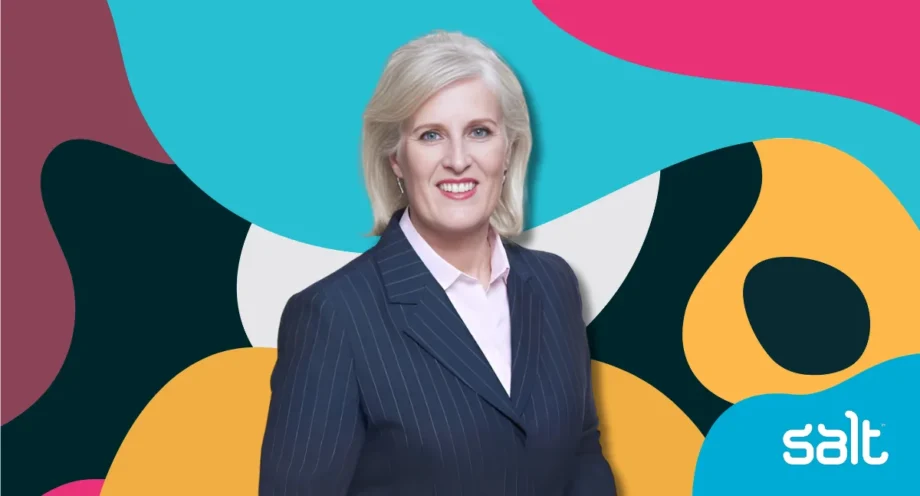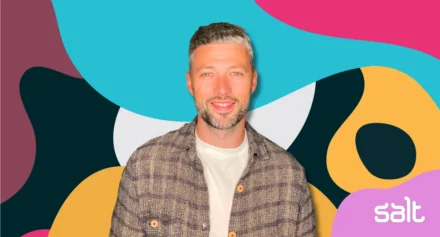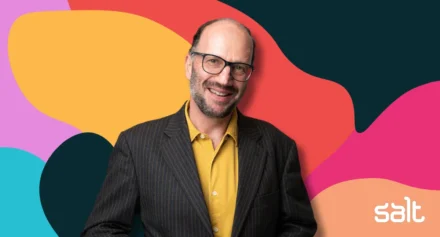Women in Tech: Angela Hunter, globally trained CMO extraordinaire
Angela Hunter, Chief Customer, Marketing & Digital Officer for Prudential, talks about diversity, advice and how to navigate and progress in your career.

For our latest Women In Tech session, we met with Angela Hunter, current Chief Customer, Marketing & Digital Officer for Prudential in Singapore. Angela has a remarkable background and international career journey to date. Tech has been at the core of her activities during her career in B2C services which has included terms at GE, Citi, IAG, and Singtel Optus. We caught up with her to talk about diversity, advice and how to navigate and progress in your career.
The #SaltSessions Women in Tech #WiT interview series speaks with thought leaders from around the world to get their opinions and advice on how they have grown their career in tech and overcome challenges and adversity during their career.
Introducing Angela
Hailing from the UK, Angela Hunter left home at 17 and never looked back! She lived in Australia and New Zealand for 25 years and moved to Singapore in the last 2 years. Angela’s professional DNA has been about growth and transformation. She is trained as CMO and GM, though her passion has always been the customer experience. Most notably, she was involved with digital and mobile when it was first launched and she has always been engaged in helping to form the connection between digital platforms and CX ever since.
What is your current role and the most exciting part of your work?
I am most excited when getting to the point when we launch products online, which has everything to do with making services more accessible. With Prudential, we have 1 million customers and $100’s of millions under management, so when we launch services online, we can really touch people’s lives based on our services. The way I see it, digital is an enabler and at Prudential, our purpose is to help our customers with health and wellness for themselves and their family — so yes, when we release products online, I feel we can really make a difference.
What has been the most career-defining moment that you are proud of?
I would have to refer to one of my earliest technology-focused engagements with Vodafone in Australia. This relates to the launch of prepaid mobile phones and was based on extensive customer research. The key positioning of the product was based on no need for credit checks, which was an industry first. Over only 12 months, this became a massive success — a $100 million turnover product! It was particularly satisfying to see the impact in developing markets like South Africa, where people had never had access to mobile services.
What do you think we should be doing more of to encourage more girls to consider a career in tech?
It starts with schooling, as many prevailing ideas are programmed at this age. Bias and typecasting plays a role and this needs addressing, though, in Asia, it’s much more accepted for a girl to study technology disciplines, which is encouraging and the West should take note. To help influence and inspire, the focus for technology needs to be on the ‘why’ and the idea of technology as an enabler. The fact is, men and women do have different tendencies and it’s OK to acknowledge that — as such the more tech is perceived at the human empathetic level, the more likely both men and women will be drawn to a career within it.
What challenges have you faced in the workplace, especially your experience in male-dominated environments?
I grew up in a family of 9 with 5 boys! This had a significant, positive impact as I built confidence around men. Females will tend to downplay strength and overplay weakness, so it’s important to push oneself forward. I have to say, I have positive working experiences regarding diversity engagement in my career at the likes of Vodafone, Prudential, and GE, and whilst I am aware of some of the challenges, I have not had significant negative exposure. I guess in summary, one’s upbringing and choice of an employer can play a big part in your career experience as a female.
In your opinion, what is the biggest obstacle to women’s career progression?
Definitely, family pressures play a part. I see women try to be perfect at work and on the home front and this can prove to be an impossible task if the employer is not accommodating, for instance, if companies are not outcome-focused and judge on hours worked. As such, women can be very hard on themselves and ultimately opt out. My observation is that women also are not as strong in negotiating on salary, so they are not as incentivised.
Who has been your biggest advocate/mentor in your career and why?
It’s important to really distinguish between the role of mentors versus advocates. I’m a big fan of the latter and can say I have benefited from it. Advocates are important to champion your cause and it’s often overlooked. It’s also very important for women who typically find it harder to network. I’ve used this approach extensively in the last 10 years — putting this into practice means that when you join a new company, it’s important to think about stakeholder mapping internally. This clearly gets more difficult the more senior you get!
During my time in Australia and New Zealand, where I made real strides forward in my career, I identified in one person both a mentor and advocate — he was a key decision maker and we used to meet regularly. The area he helped me most in was assimilating into the new company culture.
As an employer, what would you recommend to other companies regarding infrastructure to have in place to develop the best talent?
Companies need to address family-friendly policies. I am a big believer in being output-based and NOT judging based on office time. It’s also important for companies to work on talent pipelining and building pools of future high-potential female talent. Companies should also create mentorship programs and training to help bring out the best in their people — the particular focus should be on overcoming confidence issues, which is the most common issue in women, and will help unlock massive potential.
What are some of the best and worst workplace initiatives you have seen/heard of to help promote diversity?
There are many that I have seen, been involved in and would continue to advocate, such as open spaces for innovation, work flexibility and double maternity, which should also be offered to men. I have seen that these really do work from experience. I am also a fan of and have been impressed with some of the diversity and innovation forums I have seen in Asia and would encourage employers to connect with them, such as ‘Lean In’. In fact, in Asia, judging from the participants in some of start-up technology forums, there has been an impressive balance of male and female participants, which is encouraging.
What is your biggest stress reliever?
I travel extensively and dedicate myself to my family. I also exercise as often as possible.
Is there one piece of advice you wish somebody had given you at the beginning of your career?
You can only add value externally if you are in the right frame of mind internally, so it’s important to get the balance right.
Fun fact about you?
I wanted to be an international nanny! This had everything to do with travelling. With that in mind, I left home at 17 in the North of England and never stopped since!

